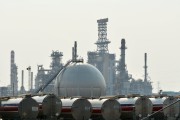In a meeting last April with the Senate Standing Committee on Energy, the Environment and Natural Resources, then-environment minister Jim Prentice said: "in terms of reducing our emissions of greenhouse gas as well as other pollutants, the more natural gas we can bring on in this country, the more desirable it is."
It's nice to think that an affordable and abundant fossil fuel could also get us closer to our climate goals — especially at a time when we need urgent action to reduce the emissions that keep turning up the dial on the earth's thermostat.
But a new report released today by the Pembina Institute and the David Suzuki Foundation challenges that assumption — and argues instead that Canada's governments need to exercise caution before approving new natural gas projects, because it turns out that fighting climate change requires less natural gas production than if governments took no action on climate.
I sat down with the report's author, Matthew Bramley, to discuss that conclusion — and what his research suggests we should do to address the climate-related and other environmental impacts of natural gas production.
Q: How would you summarize the main findings of this report?
 All the economic analysis out there leads to one main conclusion: Canada's governments should be slowing — not accelerating — the rate at which they approve new natural gas production capacity if they're serious about meeting their climate change commitments, especially when governments haven't yet put in place policies strong enough to meet their greenhouse gas emission targets.
All the economic analysis out there leads to one main conclusion: Canada's governments should be slowing — not accelerating — the rate at which they approve new natural gas production capacity if they're serious about meeting their climate change commitments, especially when governments haven't yet put in place policies strong enough to meet their greenhouse gas emission targets.
The other thing that came through very clearly in our research is that our governments don't have their act together when it comes to reducing the other negative environmental impacts of gas development — and there are some serious risks to fresh water, air quality, and the quality of life of people living amidst certain types of gas projects, particularly shale gas. Since we probably will need some new gas production — to replace declining conventional reserves — it's essential that governments do a better job on these issues.
Q: Why is it important to study this issue right now?
Currently, there's a surge of unconventional gas production across North America, because new technology has opened up huge new deposits at a time when the supply from the conventional reserves is drying up. Governments and industry are saying we need to embrace that surge to help reduce greenhouse gas emissions. But natural gas development is raising significant public concern given the impacts it would have on communities across the country — from the Northwest Territories, B.C. and Alberta to Quebec and New Brunswick.
What we wanted to do with this report was find out whether it's true that natural gas is part of the solution to climate change. The answer isn't obvious, because while replacement of coal would lead to more gas consumption, energy conservation and a shift to renewable energy would lead to less gas consumption. And if we do need some new natural gas production while fighting climate change, can we contain the other environmental impacts — on water, air and the landscape — at an acceptable level?
Ultimately, what we wanted to understand is where natural gas should fit in to Canada's energy supply mix, if Canada's serious about taking action to avoid the worst impacts of climate change.
Q: But isn't burning natural gas a better, cleaner alternative to other, less climate-friendly energy sources, like coal?
It is generally accepted that natural gas has lower emissions of greenhouse gases than other fossil fuels like coal. But switching to natural gas won't reduce emissions by anything close to as much as scientists say is needed. And also natural gas is essentially methane, which is itself a powerful greenhouse gas and can be leaked into the atmosphere from natural gas production.
So it's true that if governments put in place coherent plans to cut greenhouse gases, you'll see some replacement of coal by gas in the near term. But what you'll see even more of is replacement of coal by renewable energy, and a lot more energy conservation. What that all adds up to is less gas being consumed — in both the near and long term — than if governments took no action. And that should mean giving the green light to less new gas production.
Another problem with switching from coal to gas is that owners of new gas-fired power plants are not going to readily agree to shut down those plants in 10 or 15 years' time, when we're going to be needing to move to much deeper greenhouse gas reductions than natural gas can give us.
Ultimately we need to get away from burning fossil fuels for energy — unless the emissions are captured - and focus instead on renewable energy from the wind and the sun, which has no emissions at all.
Q: We've heard a lot of controversy about "fracking" and the extent of natural gas development in the U.S. How does the situation in Canada compare?
In a "business-as-usual" scenario, demand for natural gas is expected to continue increasing in Canada over the next several years, but the easily accessible conventional gas is running out. So companies are turning increasingly to hydraulic fracturing or "fracking" to access so-called unconventional gas, especially shale gas. Fracking involves injecting a mix of water, sand and chemicals underground to release the gas, which is trapped in the rock. Shale gas has really taken off in the U.S., starting in Texas and now in Pennsylvania, but it's also now increasing in Canada, with production underway in B.C., and exploration in Alberta, Quebec and New Brunswick.
Shale gas brings significant impacts, and governments are going to have to move fast to manage them properly. I see four main concerns:
- From my perspective, the biggest impact is the sheer industrialization of the landscape in areas where people live and there are competing activities like agriculture and tourism.
- There have been multiple cases where it's been established that natural gas is migrating to the surface, getting into drinking water and creating a risk of explosion. (The problem seems to be inadequate cementing of gas wells, not the fracking as such.)
- Shale gas has a major challenge with managing the large volumes of contaminated wastewater that comes back to the surface. It's striking how poor the industry's track record with this has been in Pennsylvania.
- Shale gas production consumes large amounts of fresh water — this can be a serious issue in areas that can be subject to drought conditions.
Given all of that, I'm sure a lot of Canadians would be surprised to learn that most natural gas wells in Canada are exempted from the normal provincial environmental assessment processes. Instead environmental issues are dealt with through separate processes that tend to be administered by natural resource ministries or agencies that depend on them. There's an obvious conflict of interest if a natural resource ministry that promotes oil and gas development is also responsible for environmental regulations that might make development more difficult.
 Q: How is a surge in unconventional gas production going to affect people living nearby?
Q: How is a surge in unconventional gas production going to affect people living nearby?
Shale gas development is very disruptive. Typically there'll be one wellpad every square mile, covering about a hectare of land. Each wellpad requires an access road and pipeline infrastructure — during drilling and fracturing, this can mean up to 18 months of noisy, day-and-night operations, and thousands of truck trips. Air quality and safety is also an issue. There's a risk of explosions if there are gas leaks or well blowouts, which have occurred recently in the shale gas industry in Pennsylvania. That's obviously very dangerous for workers and communities nearby.
Water use is another big concern — especially in dry regions. For instance, in a big shale gas region where 3,000 shale gas wells are drilled each year, production could require as much water as is used by a city the size of Windsor, Ont., or Halifax, N.S.
Q: What are the main things you want to see change in Canada's approach to natural gas?
First of all, governments should not be approving new natural gas production levels that are incompatible with meeting their own greenhouse gas targets, especially since gas production is likely to cause substantial environmental impacts in addition to contributing to climate change.
Given the likelihood and severity of those impacts, governments should be exercising a much higher level of caution before approving new production facilities — which means stronger measures to protect water, air, land and the wellbeing of people living nearby. For us it's really a no-brainer that natural gas development should have to undergo the normal environmental assessment process that applies to other industries. And we think that environmental matters should be regulated by environment ministries, not energy ministries that have a conflict of interest because they promote development. Environment ministries exist because years ago it was recognized that environmental issues are not properly dealt with unless there are bodies that are primarily focused on those issues.
Because the impacts of shale gas production are so significant — we don't think it should be permitted unless there's a high level of public acceptance within the communities that are going to be affected, and unless there's fair compensation for the impacts.
Overall, our research shows we need much better government oversight of new natural gas production — both to approve projects at a pace that reflects our commitments to address climate change, and to ensure that gas extraction doesn't cause unacceptable damage to people and the environment they live in.
Learn more:
The full report, Is natural gas a climate change solution for Canada?, is available in English and French in our publications listings — along with a detailed briefing note and presentation slides.






